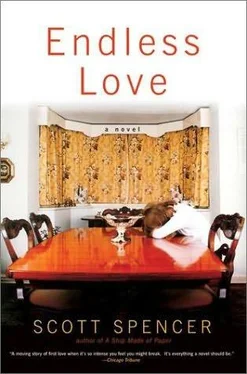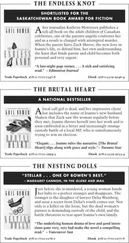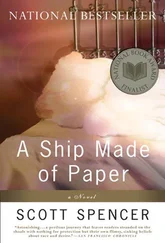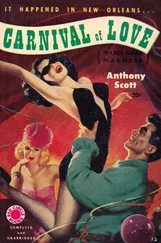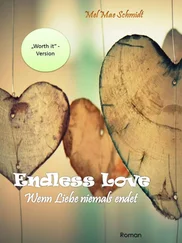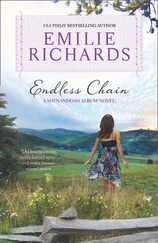You knew you were up against a lot of competition and it wasn’t enough for you to court Jade. You had to make yourself interesting—indispensable!—to the rest of us. Of course you could go a long way toward seducing each of us and you could outdistance the other passers-through in terms of sheer charm—no one else could have possibly tried so hard, no one else had your determination or cared about making an impression nearly so much. So it was botany and folk music with Keith—while he could still stand you—and karate workouts with Sammy, and Jewish novelists with me, and a kind of fawning obsequiousness for Hugh, which, unfortunately for you and your strategy, could never quite wriggle free of the superiority complex that spawned it. And for all of us Latvian folk tales you made up to get us laughing and Marxist dogma to impress us with your erudition and to inform us that while you seemed to be living for no principle loftier than your own pleasure you were, in fact, guided by huge historical considerations. Beneath it all, you were a revolutionary something-or-other, and you knew we would be enchanted by your ideals, by their certainty and their hidden promise of a transcendent life. Scorning the liberals was, at least for us, a version of strolling around Hyde Park blasted out of our minds: a way of being in the world and above it at the same time, immune to comparison or judgment.
But forget Latvia and the Russian Revolution, forget Gimpel the Fool and your periodic thank yous to Hugh for his hand in winning World War II. The thing that made you vivid to us, in the end, was the one thing you did effortlessly. And that was loving Jade. And it was Hugh, you should know, who recognized it first—not the love, which I saw as inevitable when all you two were doing was wanting each other, but the weird, unique force the two of you generated, which Hugh saw months before we finally banished you from the house.
It was one thing to allow our daughter the freedom to express love (especially when she had such a hard time expressing it within the family), but quite another matter to see this liberty catapult her into a relationship every bit as intense as what Hugh and I called “mature love.” We were OK on letting her be sexual, OK on letting her find her individuality outside of the family structure, but I must say Hugh and I were assuming Jade would begin her sexual life with some sort of puppy love, something more quintessentially adolescent, which was to say something filled with doubts, lapses in concentration, some connection that more distinctly expressed the peculiar mixture of child and woman she was at that time. We felt as if we’d given a child permission to experiment with a little chemistry set only to find she was an undiscovered genius—solving ancient alchemical riddles, bonding once incompatible molecules, filling the cellar with luminous smoke. We simply had no idea of what we were in for; we totally underestimated the incredible emotional reach she was capable of. We were too accustomed to seeing Jade in one way. Yawning, slightly withdrawn, orderly, conservative, evasive, with not much of a relationship with her own body, save worrying abstractly over her weight and lamenting the smallness of her breasts.
It drove Hugh mad; it tore him in half. It absolutely galled him to think of his precious daughter naked in bed with a boy. Left alone, I’m sure that Hugh’s incestuous fantasies would have atrophied. But having Jade embrace the sexual life just when she was at the juncture between childhood and womanhood triggered a deep, conflicted, painful yearning in Hugh, and he wanted you to go away because he wanted it to go away. He’d been raised to believe it was OK to be protective and even possessive about your daughter, but poor Hugh was too closely attuned to the truth and ambiguity of his own feelings: more purely passionate than anyone in his family, he could not ignore the measure of sheer jealousy in his feelings about you and Jade.
But, on the other hand, you two had the same effect on poor Hugh that you had on nearly everyone else. That is, you made him recall the most inarticulate, unreasonable romantic hopes he had ever had. All that was betrayed and lost, all that was refined and diminished, all of that raging wilderness of feeling came rushing back to Hugh. I was different; seeing you two in love only made me mourn for the person I never was, for the risks I’d never taken, for my life more or less on the sidelines. But Hugh actually recognized himself in you two. Actual faces, actual moments, the precise emotional content of broken promises came back to him. With me it was mere jealousy; but Hugh experienced all the ecstasy and sorrow of memory.
Hugh was wide open for the sucker punch of your example. I saw him reeling and I took advantage. I encouraged him to believe that our lives might safely hop track, that instead of growing older we might grow younger, and instead of becoming more encumbered we might catapult into a vast, vast freedom. The house, our precariously balanced budget, the carefully tended and mended clothes hanging in our closets, the boiled eggs, the tarnished spoons, the Klee prints in their homemade frames—none of it, I argued, need define the real limits of our life. We could do anything.
And the rest, as they say, is history. I took one lover and he took a dozen. I smoked a joint and he smoked a pound. I hinted at the contradictions in my character and he poured forth torrents of confession. I shed a tear and he wept copiously. And then when I began to wonder if perhaps we were being a tad indulgent and letting our paternal responsibilities go a little too much, Hugh went into a shuddering panic, reaching out for the familiar controls that now eluded him, or wouldn’t respond to his touch. What happened to the family meetings? Who was ironing his shirts? He said he felt like the pilot of a fighter whose tail’s been hit—loss of altitude, sudden shifts of direction, the high whistle of impending doom.
Who knows what form that impending doom would have taken if it hadn’t been for you? A nervous breakdown? A bad trip? (Ah-ha! I can see you starting to wriggle, imagining that you’re being let off the hook. Only it’s not your sense of guilt that ought to be relieved, but your megalomania. How dare you even imagine that you and only you were enough to unravel our family.) Yet, in the end, you were the perfect messenger for our special domestic ruin. If it was at least in part on your inspiration that we began to step over the old limits of married life, there was a berserk symmetry in that it was you who finally dragged us further from our old ways than we’d ever intended to travel. It was us who wanted to prove that our lives weren’t circumscribed by the walls of our house, by the clothes in our closets, by the Klee prints in the homemade frames. And it was you with a flick of the wrist who turned it all to ash.
A.
Ann’s letter did everything an important letter is supposed to: it changed my luck, my confidence, it changed my place in the world. In school, my teachers finally recognized me when we met in the halls and suddenly people in my classes were talking to me—asking to see my notes for Tuesday’s lecture, asking me to coffee, to lunch, and inviting me with some slight shyness to get together with four or five other students and review the material for an upcoming test, as if it would be me who’d be doing them the favor. Even when I was picketing, some of the people who passed looked at me as if I really existed, and a few stopped to tell me that they wouldn’t ever buy a pair of nonunion trousers. One old man coming out of Sidney Nagle’s with a plain gray box in a red and white bag put his thin hand on my arm and said, “I’m sorry. I just bought a pair of Redman pants. My son-in-law gave me a list. It’s not for me. For me, I would never. But the son-in-law doesn’t know union from Joe Blow. I’m sorry.” And he stood there gazing at me until I realized what he wanted and I touched his hand and smiled. I was forgiving other people!
Читать дальше
